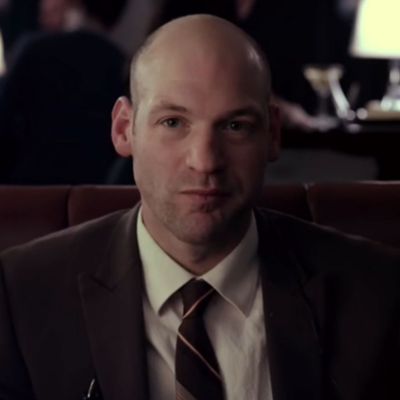
Corey Stoll has a nice face. ItÔÇÖs not a┬ákind┬áface, exactly ÔÇö the eyes are too sharp, the nose too rough for that. But thereÔÇÖs something about that boyish half-smile, and those lean features: You feel for the guy, even if you donÔÇÖt trust him. And his ability to play with our identification is impressive. He can go from loutish to likable in an instant, which he did so well as the doomed, corrupt, but very human politician Peter Russo on the first season of┬áHouse of Cards. Now this quality serves him well in Noah BuschelÔÇÖs admirably spare noir┬áGlass Chin.
The film offers a new road into an old tale. Stoll is Bud Gordon, a former boxer once known as the Saint, who years ago lost a big bout after getting knocked out in the fifth round ÔÇö after dominating for four rounds, hence the idea of him having a ÔÇ£glass chin.ÔÇØ Life hasnÔÇÖt worked out well for Bud in the years since. He started a restaurant that failed. He lives out of a tiny New Jersey apartment with his girlfriend, Ellen (Marin Ireland), dreaming of New York and big houses. When we first see him, heÔÇÖs jogging in the predawn hours with his dog, Silly, muttering about how heÔÇÖs going to make a comeback ÔÇö just another palooka who refuses to give up on his dreams, even if he canÔÇÖt pay for his morning coffee. Coming home, he refuses to let Ellen circle employment ads in the local paper. ÔÇ£Give me a week,ÔÇØ he says, forever convinced that things are about to take a turn for the better.
Bud is mulling getting back into boxing to help train a young up-and-comer named Kid Sunshine (Malcolm Xavier). But bearing down hard is Buds old friend, modern-day gangster JJ Cook (Billy Crudup), who wants Bud to come work for him. Played by Crudup as a slick, grandiose phony prone to monologues about the iCloud and how he misses heroin chic (emaciated suicidal teen haute couture  itll come back), JJ is utterly transparent in his insincerity; hes the opposite of Bud, whose desperation shines through no matter what. But JJ has the power to make things happen, and thats whats important. Before he knows it, Bud has been suckered into doing the rounds with Roberto (Yul Vazquez), one of JJs crazier, more flamboyant enforcers.
Story-wise, nothing in Glass Chin will surprise you. But stylistically, the filmÔÇÖs got something cool going on. Buschel shoots his scenes largely in long takes that are notable as much for the things they leave out as the things they leave in. ItÔÇÖs the kind of film in which what might be called plot often occurs offscreen: A crucial fight happens over the radio; we read about a murder in the paper; when Bud trains Kid Sunshine, we see just a tiny glimpse of their workout. That could be a result of both aesthetic and financial needs: The film was clearly made for a dime. But it focuses our attention on what characters say, how they react ÔÇö which, in this case, might be more important than what they do. JJ, Roberto says, ÔÇ£loves to collect people.ÔÇØ So, too, one could argue, does the film.
But for all the tough, streamlined elegance of its design, Glass Chin isnÔÇÖt quite as poetically astute as it wants to be. BuschelÔÇÖs script is filled with monologues and exchanges that are often a little too strained or on-the-nose. At one point, JJ discusses a snow leopard he keeps as a pet, while railing against the mundane: ÔÇ£Ordinary is our enemy. Ordinary people doing ordinary things, like the laundry,ÔÇØ he warns Bud, finally ending with, ÔÇ£You will be burnished! I will illuminize [sic] your world!ÔÇØ ┬áItÔÇÖs meant to be ridiculous, but a little of this stuff goes a long way, and Glass Chin has quite a bit of it. Do we really need Bud to talk to his dog just so he can say, ÔÇ£WeÔÇÖre making our way back to the top of the heapÔÇØ? The writing-class-exercise quality of some of this stuff canÔÇÖt match the tense, studied austerity of the filmÔÇÖs visuals.
So itÔÇÖs a good thing the film has that cast, and Stoll in particular. HeÔÇÖs the main reason to watch Glass Chin. And not coincidentally, heÔÇÖs often quiet. Brief exchanges with his dog notwithstanding, Bud doesnÔÇÖt get the monologues the rest of the cast does. For all his ambition and drive and pain, heÔÇÖs somewhat passive, absorbing everyone elseÔÇÖs stories and wounds and exhortations. ┬áHis is a story thatÔÇÖs conveyed less through words and more through his face. And like I said, itÔÇÖs a good face.


